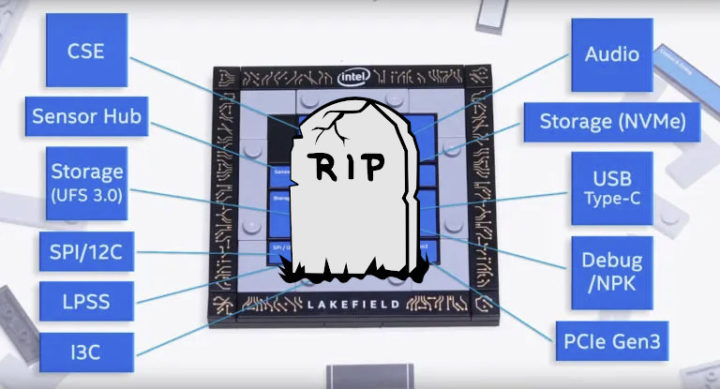Intel launched Core i3-L13G4 and Core i5-L16G7 penta-core Lakefield Hybrid processors last year with one high-performance Sunny core, and four high-efficiency Atom Tremont cores, in a way that’s similar to what Arm is doing with DynamIQ and before that, big.LITTLE technology.
The new processors were found in Lenovo ThinkPad X1 Fold foldable tablet and Samsung Galaxy Book S laptop, both premium products sold for over $2,000. Even some large websites never got hold of a testing sample of those products, and Anandtech has just reported that Intel published a product change notification (PCN) with the title “Select Intel Core Processors with Intel Hybrid Technology, PCN 118334-00, Product Discontinuance, End of Life”.
The discontinuance of Lakefield hybrid processors is a shocker considering they were just introduced last year, but I don’t think it will affect many people as I hadn’t heard about any upcoming boards or products based on Intel’s hybrid processor.
The last orders must be made by October and the latest shipment is scheduled for next year as follows:
- Product Discontinuance Program Support Begins – July 06, 2021
- Last Corporate Assurance Product Critical Date – October 08, 2021
- Last Product Discontinuance Order Date – October 22, 2021
- Orders are Non-Cancelable and Non-Returnable After – October 22, 2021
- Last Product Discontinuance Shipment Date – April 29, 2022
Intel Lakefield promised to compete with Arm processors from Qualcomm in terms of battery life, but it’s not all over for Intel’s hybrid technology, as Anandtech notes the upcoming Alder Lake platform is set to launch end of this year in either desktops or notebooks, and Windows 11 scheduler may work better with Intel’s hybrid designs than Windows 10.

Jean-Luc started CNX Software in 2010 as a part-time endeavor, before quitting his job as a software engineering manager, and starting to write daily news, and reviews full time later in 2011.
Support CNX Software! Donate via cryptocurrencies, become a Patron on Patreon, or purchase goods on Amazon or Aliexpress






Intel threw the kitchen sink at Lakefield, using expensive 3D stacking on the die. But it didn’t have great performance at launch and the prices were stupid high. I hear that performance improved with driver updates, and I suppose it will improve further as Windows 11 is designed to support heterogeneous CPUs (Linux has also been updated for Alder Lake). Penta-core 1+4 big/small should definitely make a return to future Atom Pentium/Celeron lineups. One fast core for good single-threaded performance, four small cores for multi-threaded. I don’t see why Intel couldn’t do it within the ~6 Watt TDP on enhanced… Read more »
This was more of a R&D product, right? Just to put out there and start optimizing linux and windows for it and then launch CPUs with the support already there.
What I would like to see is similar implementation where a SOC can have variable TDP.
So in one circumstance, like many a typical ARM chip, something can run happily run many a task with under 10 watts power draw, where more power was required that the power could be ramped up accordingly but only when required.
I am guessing that this, in principle is where Intel was heading with Lakefield.
Oops 🙂
Will Rocket Lake see the exit door six months after Alder Lake becomes available and… successful?
I think that if you don’t have support for small+big cores in OS whole idea is useless.
Anybody know how os plan and distribute workload across small anb big cores?
I can imagine that for example on android all phone related workloads can run on small cores => minimul power are required
a for example browser/games will be prioritize on big cores
But I can’t find any general strategy that will be usefull for server 🙂
For me intel big core strategy is pure marketing as it looks like more cores for customers
Heterogeneous x86 CPU support is being pushed with Windows 11 and latest versions of Linux. Benchmarks will prove how well it works, including power efficiency benefits. Someone probably knows about big/small on server chips beyond Sapphire Rapids. Some servers could use a small amount of big cores for single-threaded workloads and hundreds of small cores for parallel tasks or concurrent users. With multiple tiles, why not 8 big cores and 256 small cores with 2+64 per tile? Intel can easily go deceptive with the marketing, but better multi-threaded performance per die area and power efficiency are likely to be real… Read more »
ARM will “eat”, Intel and AMD in the low-end PC sooner than later.
Hopes for Huawei L410.
Is it just me or after Apple M1, anything AMD/Intel looks pathetic?
This is frustrating for those of us hoping to get linux running on the Samsung Galaxy Book S. The keyboard and track pad are i2c devices and there are neither implementation nor documentation for the embedded pch in the soc. Intel canceling the chip makes the hope of such being supported less likely.I guess I shouldn’t have bought it.
Ed, I feel the pain and agree 100%. Not nice at all from Intel!
manjaremint
Very bad from Intel, I say
Stab in the back